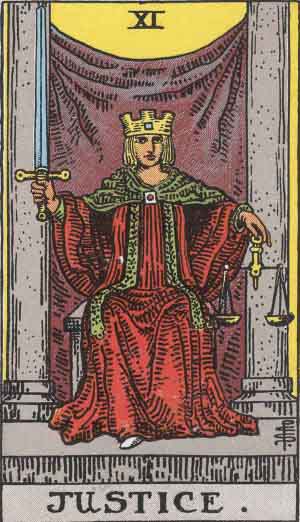Card Meaning: XI Justice

Element: Air
Zodiac: Libra
Hebrew letter: Lamed, ל
General
It is of the utmost importance to preserve balance in life. Any inbalance can
endure only for a period of time, then it is time to pay the price. Here we see
the effects of Karma, everything we experience today has a root in our actions
from yestreday, and our actions today will shape our life tommorow. Every unfair
and negative thought or deed goes against us, hopefully balanced out by every
good deed and positive thought. But this card is not about the punishment, but
about adjustment of our thoughts and actions. One must see the inner connection
between our inner and outer worlds, between our actions and fate. When
connection is clear, adjustement comes natural as we reject obsolete patterns
that are no longer useful, and more often, that are even harmful to us. If we
consider The Fool as a perspective of the unmanifested and thus,
The Magician as
a first card illustrating our known world, we can easily conclude that the
Justice card is in the exact middle of the Major Arcana, apparently pointing to the property of the
perfect balance of ten cards on each side of the Justice. Also, the Justice is
the first card of next ten cards of the Major Arcana, a symbolic threshold from
physical world to metaphysical world.
History
Through history this card hasn't endured much alteration. Well-known
figure of a woman sitting with scales and a sword in her hands is more or less constant.
In Visconti-Sforza tarot on the wall behind her there is a knight with the sword
drawn, galloping to deliver the justice to the world. Her figure is probably
modelled after the Roman goddess Justitia and the Greek goddess Themis. In some
editions of Tarot de Marseille her throne seems to be winged.
Reading
This card stands for fairness, impartiality, balance and equity. True justice is
possible through purity of spirit. Every action has its consequences, think
about your choices. A time comes when responsibilities must be accepted, and
accounts settled. Reversed, it can indicate bias, injustice or playing the role
of a victim and perpetrator. That is illusion, stop blaming other people if
things go wrong and take control of your own lives. Keep an eye on your actions
and make sure you don't do anything you may regret afterwards. Unexpected legal
issue possible.
Symbolism
woman with the scales and sword, balance, karma,
The Justice bears a sword in her right hand and scales in her left. The sword
is symbol of the discerning mind and mental capacity as indicated in the suit of
the
Swords. The scales represent a
balance, the balance is achived between harmonius emotions and mind as indicated
by the pans. Thus, through transcedence of emotional and mental prejudices we
can employ pure discernment to arrive to
the fair decision and compromise. The sword is held high in the right hand to
symbolize the action of correcting wrongs and holding the balance of justice.
The sword also has a double blade, thus we don't get always what we want but
what we deserve. The handle of the sword is shaped like a letter T, shorthand of
the planet of structure and limitation, Saturn, underscoring the fact that universal
law is often above our individual desires and hopes. We saw in the
Wheel Of
Fortune card that from our perspective fate is sometimes very unpredicatable
variable. Justice extends her foot, showing readiness to act in any moment. Her
dress is red, indicating desire, but under she wears a green capelet, indicating
precedence of love symbolized by green colour. Red and green combine to make a
grey, the colour of wisdom. On her left and right side there are two grey
pillars, between them a courtain with a noticable symetric form, emphasizing again
the balance that is the main theme of this card. The Hebrew letter Lamed can be
used as a verb, meaning "to educate", pointing that our actions and their fruits
are here to educate us on our spiritual path.
As this card follows the traditional symbolism and carries above all its obvious
meanings, there is little to say regarding it outside the few considerations
collected in the first part, to which the reader is referred.
It will be seen, however, that the figure is seated between pillars, like the
High Priestess, and on this account it seems desirable to indicate that the
moral principle which deals unto every man according to his works--while, of
course, it is in strict analogy with higher things;--differs in its essence from
the spiritual justice which is involved in the idea of election. The latter
belongs to a mysterious order of Providence, in virtue of which it is possible
for certain men to conceive the idea of dedication to the highest things. The
operation of this is like the breathing of the Spirit where it wills, and we
have no canon of criticism or ground of explanation concerning it. It is
analogous to the possession of the fairy gifts and the high gifts and the
gracious gifts of the poet: we have them or have not, and their presence is as
much a mystery as their absence. The law of Justice is not however involved by
either alternative. In conclusion, the pillars of Justice open into one world
and the pillars of the High Priestess into another.
— The Pictorial Key to the Tarot, by A.E. Waite